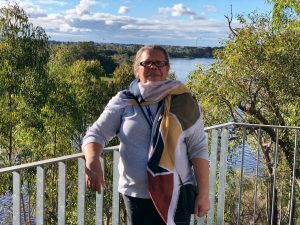After a recent tour of northern Western Australia promoting the benefits of My Health Record, Sandra Ryder has recently joined the WA Primary Health Alliance (WAPHA) Aboriginal Health team, as the Aboriginal Health Coordinator.
Sandra, a Noongar-Yued woman raised in New Norcia, said access to healthcare, a good patient experience and making the journey from country to city easier are all part of improving health outcomes for Aboriginal people in WA.
In her new role, Sandra hopes to be back on the road again soon, this time supporting the service providers WAPHA funds to implement and deliver the Integrated Team Care (ITC) program.
ITC helps Aboriginal people to better coordinate the management of their chronic condition and improve their access to support and other services.
Sandra said Aboriginal people travelling from regional and remote communities to Perth for treatment can face a number of challenges.
“Sometimes people with a chronic illness have to pack up and travel multiple times to Perth,” Sandra said.
“Sometimes they leave their medication behind and it can be difficult to replace once they are in Perth.”
Last year, this and other similar feedback inspired WAPHA’s ITC Country to City: Improving Patient Transitions project, which highlighted the need to design solutions to address system-wide problems.
The report’s recommendations are now being implemented, aiming to help many of the more than 1,000 ITC clients across Western Australia, from Albany in the south to Kununurra in the north, who may need to travel away from home for healthcare.
Since joining the Aboriginal Health team, even though Sandra’s focus is the ITC program, she continues to promote the many benefits of My Health Record.
“My Health Record is a bonus for Aboriginal people. Having a yarn is good but repeating yourself when sometimes English is your third language is tricky,” Sandra said.
“Also, it helps when you have all your medication, the names and all the information about it in the one place.”
WAPHA is working with partners to deliver ‘Better Health, Together’ by focusing on Aboriginal health as a key priority, including:
• Supporting Aboriginal people with chronic disease to manage their own healthcare
• Ensuring Aboriginal people receive the right care
• Linking Aboriginal people from regional areas to primary healthcare
• Helping to develop a culturally aware workforce
• Listening to local communities to understand who they are and their health needs
• Linking general practices to culturally appropriate support
As part of the Australian Government’s Primary Health Network initiative, WAPHA operates across the state, improving access to healthcare closer to home for those at risk of poor health outcomes. We help simplify and increase access to primary healthcare by planning, guiding and directing investment towards important services.
For more information about WA Primary Health Alliance and Aboriginal health click here.
